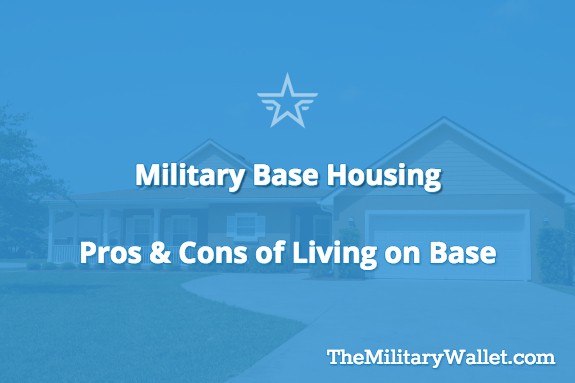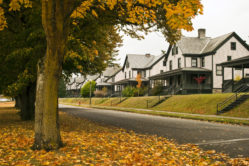Every time a military family gets orders to a new base, they face this important question: where to live? All married service members receive a Basic Allowance for Housing (BAH) to cover their rent. The family can choose to live on base in government housing, in which case the BAH will be automatically deducted from the paycheck and sent to the property management company. If the family decides to live off base, they can rent or buy any property they choose and apply the BAH towards rent and utility bills.
There is no magic answer for which solution is best. There may be some bases where your family should live off base and others where it works better to live on base. Our family has lived off base at two different locations and on base twice, too. Every choice has its own pros and cons. There are so many factors to consider that we are breaking this into two articles. Today’s post will discuss the pros and cons of living ON base in military housing.
Benefits of Living on Base
- Safe, gated neighborhoods: Nothing is more secure than a military facility with 24-hour gate guards! There is still petty theft and some crime on military bases, but very few violent crimes.
- Family-friendly environment: Everything on base is designed to help military families. If you have children, you will fit right in and find this very convenient.
- Few bills: You will not pay for rent, water, sewer, or trash pickup on base. You only pay electric if your bill goes over the average range.
- Maintenance is free: Having maintenance through the Housing office is a life-saver during deployments. They fix everything, from water leaks to broken appliances to missing light bulbs.
- Kids can walk to school and playgrounds: When we live on base, we get a lot more exercise by walking or biking to friends’ houses instead of driving.
- Gym, swimming pools, and other base activities: Bases include these amenities for free in most neighborhoods.
- Shorter commute for the service member: Living on base puts us within a few miles of my husband’s work. That makes it more likely he will come home for lunch or be home in time for dinner.
- Built-in social community: Military bases are a tight community, and there is always someone willing to help if you need it. Neighbors will typically be of a similar rank or family size, so you automatically have a few things in common. Plus, you can use the Recreation Checkout.
- Family can survive with one car: Since most neighborhoods are walking distance to the Commissary, PX, and gym, a stay-at-home mom doesn’t always need a 2nd
Disadvantages of Living on Base
- Lose all BAH: Since BAH is taken to cover rent and average electrical use, you won’t see any of it, even if the service member gets promoted.
- Fewer choices: Many houses are old, small, and uninteresting and will not include fancy amenities. You will be assigned a neighborhood and home based on the service member’s rank and number of dependents. You can turn down a house, but only once or twice.
- Long waiting lists: Some base neighborhoods have waiting lists of 6 months-1 year. You should apply for housing as soon as you get orders if you want to live on base.
- May pay more for electricity: The RECP energy billing program uses “neighborhood averages” to compute your electric bill. Some military families on base pay much higher bills than average families off base. Read more about the program here.
- “Fishbowl” effect: On base, everyone knows each other’s business. This can lead to drama and tension, depending on your personality.
- Never really get away from work: The service member may be surrounded by co-workers and superiors, even when they come home. For some people, this makes it difficult to feel relaxed on base.
What About Overseas Stations?
Overseas duty stations always have some base housing available if you want to live on base. Military bases overseas are designed to feel like America: base housing will use American-style electric outlets and currents, including American appliances, and have American-style bathrooms. The prices at the Commissary are in dollars, and the base schools teach all classes in English. Base housing overseas includes most of the same pros and cons discussed above.
However, military families overseas also have the option to live off-base in the local economy. Instead of BAH, they receive an Overseas Housing Allowance (OHA), which is calculated by rank to cover housing based on local prices in that country. That will be discussed more in Part 2: the pros and cons of living off base in the local community. Stay tuned!
Have you lived in base housing? What did you enjoy or dislike?




Comments:
About the comments on this site:
These responses are not provided or commissioned by the bank advertiser. Responses have not been reviewed, approved or otherwise endorsed by the bank advertiser. It is not the bank advertiser’s responsibility to ensure all posts and/or questions are answered.
Danielle says
Not all overseas bases provide on base housing. Aviano, Italy for example does not, and a lot of other smaller bases work the same way.
Leah says
I got married on base last Saturday. My partner handles paperwork for the army and we live on base. I dislike the limited options. But it cannot be helped.